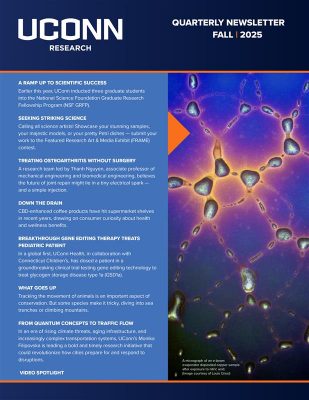Current Research News
-

Experts offered their responses to the question ‘Will AI Replace Us?’
-

UConn School of Medicine offering innovative clinical trial testing novel pill’s impact for reducing inflammation to treat Parkinson’s disease
-

The study by UConn Law Professor Miguel de Figueiredo – the largest quantitative analysis of warrants to date – is the focus of a panel discussion at 5 p.m. Thursday, Feb. 19, at UConn School of Law
- category: research
- columns: 4
- pictures: true
- number-of-posts: 3
- read-more-text: Continue Reading
- show-excerpt: true
- show-date: true
- safe-fetch: 1
- attempted-request: https://today.uconn.edu/wp-rest/wp/v2/posts?category-name=research&posts_per_page=3&adjacent-posts=true&_embed
-

UConn School of Medicine offering innovative clinical trial testing novel pill’s impact for reducing inflammation to treat Parkinson’s disease
-

The study by UConn Law Professor Miguel de Figueiredo – the largest quantitative analysis of warrants to date – is the focus of a panel discussion at 5 p.m. Thursday, Feb. 19, at UConn School of Law
-

‘If we could even save one life, it’s well worth all the time, effort and money that we put into making our roadways safer’
- category: research
- columns: 4
- offset: 3
- pictures: true
- number-of-posts: 3
- read-more-text: Continue Reading
- show-excerpt: true
- show-date: true
- safe-fetch: 1
- attempted-request: https://today.uconn.edu/wp-rest/wp/v2/posts?category-name=research&offset=3&posts_per_page=3&adjacent-posts=true&_embed
2024: A Year of Research That Mattered
UConn’s research achievements extend from health and wellness breakthroughs to advancements in quantum technology and much more.
2024 Research Review

